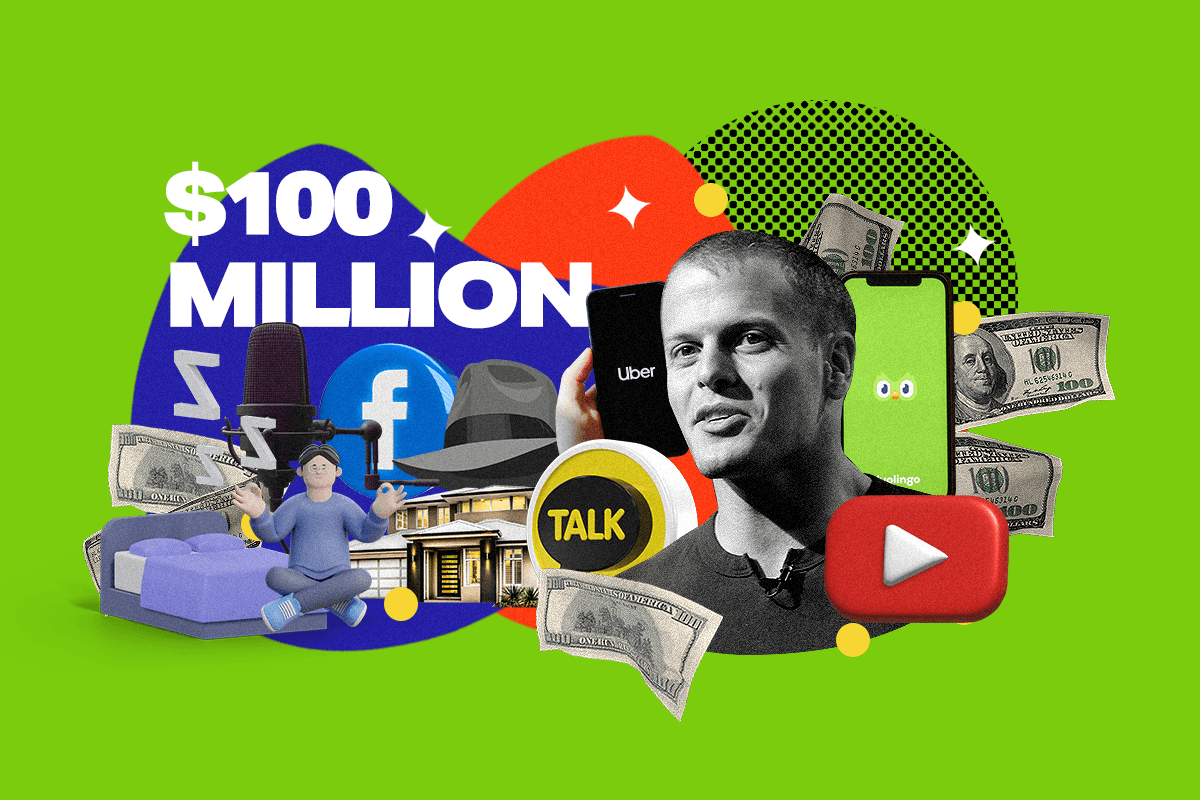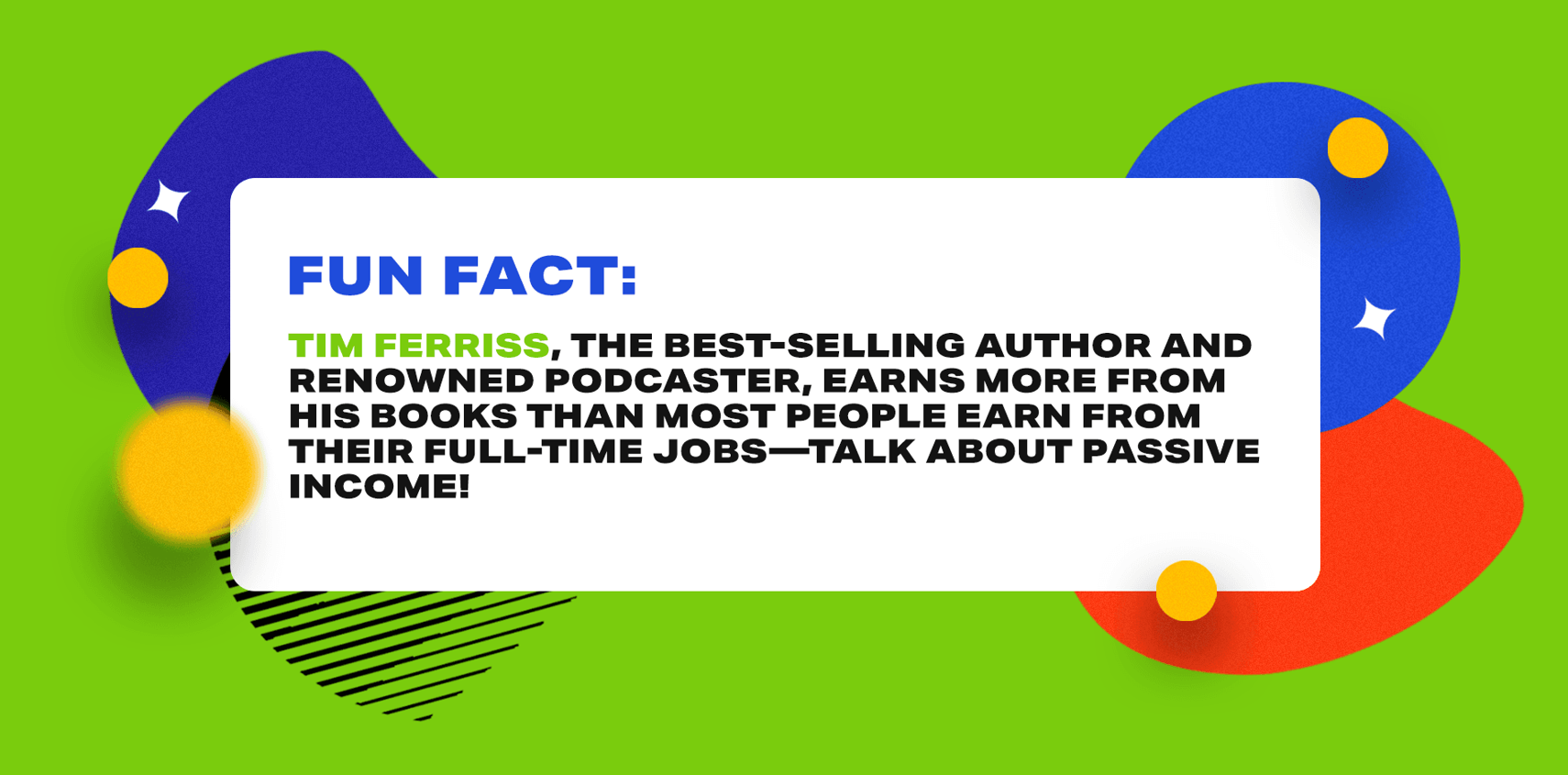Rich Dudes│Tim Ferriss Made His $100M Net Worth With Books, Podcasts, and Startups
Tim Ferriss is an entrepreneur who started a podcast a decade ago and never looked back. Here’s a breakdown of his nine-figure net worth.

Tim Ferriss is something of a superhuman. At 45 years old, this 5’ 8” dynamo is a jack-of-all-trades, an entrepreneur, investor, author, and podcaster who has achieved success in a variety of fields. Tim has a net worth of $100 million, thanks to some pretty incredible achievements.
His podcast money alone brings in over $100,000 per episode reportedly and he can charge up to $50,000 per advertiser.
He wrote The 4-Hour Workweek which sold millions of copies and became a New York Times Bestseller. He later wrote The 4-Hour Body, which was also a success. Tim has been named one of Fast Company’s “Most Innovative Business People” and one of Fortune’s “40 under 40″ and was ranked #6 in the “Top 20 Angel Investor” rankings in 2014.
But how did Timothy Ferriss net such a glamorous net worth? It all started with his company BrainQUICKEN, which sold nutritional supplements and made him a millionaire. He then went on to write his books, which gave him a whole new level of fame. His podcast, which features interviews with some of the most successful people in the world, brings in up to $108,000 per episode from sponsors. He has also been successful at investing in startups, including Uber, Facebook, Shopify, Duolingo, Alibaba, and over 50 others, and has earned a salary estimated to be around $10 million per year.
Tim Ferriss has been invited to speak at some of the world’s most innovative organizations and events, including TED, The EG, E-Tech, SXSW, LeWeb, and the Web 2.0 Exposition, and is living proof that hard work, persistence, and a bit of luck can help you achieve your dreams.
Tim Ferriss’s net worth at a glance:
| Net worth | $100 million |
| Born | July 20, 1977 |
| Nationality | American born in East Hampton, New York |
| Became a millionaire | 26 |
| Occupations | Entrepreneur, author, angel investor, podcaster, blogger |
| Sources of wealth | BrainQUICKEN, Uber, Shopify, Evernote, Taskrabbit, podcasting, book royalties |
| Asset classes | Startups, podcasting, books |

How Tim Ferriss made his money
Tim Ferriss is a perfect reflection of how a determined, hardworking individual can achieve true success. After studying at Princeton, he decided to try his luck in the entrepreneurial world and started his own supplement business, BrainQuicken, which within a year was netting him $40,000 a month.
From then on, he achieved even more success as an angel investor, investing in companies such as Facebook, Twitter, and Uber, which are worth tens of billions of dollars combined. He also wrote the best-selling 4-Hour Workweek and other books, initially receiving a lucrative book deal.
It didn’t stop there. He also has The Tim Ferriss Show podcast with over 900 million downloads and a $50,000 per episode sponsorship fee range. His website “Tim’s Blog” also drives more traffic to his brand. If that wasn’t enough, he even sold BrainQuicken to a London-based private equity firm for an undisclosed amount estimated to be several million dollars.
All of that allowed Tim Ferriss to achieve an estimated net worth of $100 million. It shows that anyone who’s passionate and works hard can make their dreams a reality.
How Tim Ferriss invests his money
Whether you call him the “king of side hustles” or the “master of entrepreneurs,” Tim Ferriss knows a thing or two about investing. To start, he invested in Uber and Shopify, two of the biggest success stories in recent history. Both of these investments have paid off handsomely, with Uber alone being valued at over $50 billion.
Next, he took a chance on Facebook, Twitter, and Alibaba, with each of these investments yielding him millions of dollars. But that’s not all, he also made an early investment in Duolingo and has numerous other startups. The man is like a money-making machine, and his investments have yielded him hundreds of millions of dollars.
Tim has also earned millions of dollars in profits from writing books, hosting a podcast, and running a YouTube channel. He has five bestselling books that have sold millions of copies and earned him over $2 million in royalties. The Tim Ferriss podcast has nearly a billion downloads and he makes between $418 to $6,700 monthly from his YouTube Channel. Tim also has a blog generating over 366k monthly traffic.
With his smart investments, Tim Ferriss has certainly earned his place as one of the planet’s leading angel investors and online business gurus of our time.
Startups
Tim Ferriss is the king of the start-up game. He knows how to make a buck, and then some. He has a Barbell Investing Strategy that he abides by, investing the majority of his money into low-cost index funds while taking a small percentage and investing it into highly speculative, but potentially high-return, startups.
This method of investing is risky, as 90% of startups fail. But, when they pay off, they pay off big. Just take Uber, Lyft, StumbleUpon, and Meta as examples. All of these companies are worth tens of billions of dollars combined and have multiplied Tim’s starting capital by 1,000 times without any external funding.
Currently, Tim has a record of 48 investments and 20 portfolio exits, and he’s made considerable investments in many big tech companies at their start-up stage. He’s even been named one of the world’s leading technology angel investors by CNN.
So, if you’re looking to make some serious money, you could follow Tim’s lead and invest in start-ups. Just make sure you’re only investing what you can afford to lose.
Startups as an investment have seen remarkable growth in the past few years, with over 50% of crowdfunding campaigns meeting their initial goals, and 78% exceeding it. With a projected market value of over $43 billion by 2028, it’s clear that startups are a lucrative investment option.
Looks like this trend could continue in 2023, with investors expecting more ‘unicorns’ (startups with $1 billion or more) to emerge and international markets to keep providing new and exciting opportunities. Brace for a a wild ride in 2023, as the venture capital landscape is off to the races.
The Tim Ferriss Show podcast
Tim has invested a lot of time and effort into creating a top business podcast, The Tim Ferriss Show, and it has certainly paid off. His podcast is one of the most popular Apple podcasts in the world and has been selected for “Best of Apple Podcasts” three years running.
In the podcast, he deconstructs highly successful individuals from different walks of life, including investing, sports, business, and more to extract strategies, principles, and routines that help listeners succeed. Past guests include Lebron James, Edward Norton, Arnold Schwarzenegger, Hugh Jackman, Jamie Foxx, Kevin Hart, Mark Zuckerberg, and over 600 others.
How much does Tim Ferriss earn? His podcast money alone brings in over $100,000 per episode reportedly and he can charge up to $50,000 per advertiser. With 5 advertisements per episode, the Tim Ferriss podcast can make up to $250,000 per episode. That’s not a bad return on investment for such a low-cost venture.
Then there’s the money Tim makes from the podcast itself. With over 420 episodes and counting, Tim has certainly made a killing, leading us to conclude he has raked in as much as $50 million over the life of the show.
So if you’re looking for a way to make a fortune, you might want to take a page from Tim’s book and start your own podcast.

Source: tim.blog
In 2022, the podcast market continued its rapid growth, with ad spend increasing by 58% to reach $4.9 billion. Looking ahead to 2023 and beyond, podcasting is expected to continue growing as platforms focus on creating more effective advertising, developing sophisticated measurement tools, and curating more diversity of content.

Books and digital media
Tim Ferriss is a multi-millionaire thanks to his book deals, YouTube channel, email list, and blog. He’s sold over two million copies of his book The 4-Hour Work Week and an estimated million copies of his other books.
Tim’s email list is estimated to have between one and 10 million subscribers, and it’s also said he pulls in hundreds of thousands, if not millions of dollars a month from his blog alone.
On YouTube, with one million subscribers and over 1000 videos uploaded, Tim Ferriss makes between $400 to $7,000 monthly from his YouTube Channel. Tim’s blog generates around 366,000 monthly traffic and brings in an untold sum from affiliate marketing and sponsorships. Tim Ferriss is living the fuckin’ dream.

Source: tim.blog
If you’re an aspiring author looking for a lucrative investment opportunity, then book authorship could be the way to go. With the right resources, dedication, and a bit of luck, you can make a killing in the literary world.
Let’s look at the numbers: If you are a traditionally published author and you receive an average advance of $10,000, you need to sell around 1000 copies of a book that costs $20 per copy to break even after printing and distribution costs.
After that, you will receive royalties of 10% to 15% per book. This means that with an average royalty rate of 12.5%, you would make an extra $12.50 per book—you would need to sell 800 books to make a profit of $10,000.
Now, let’s look at the numbers for self-publishers. Amazon pays self-published authors 70% of the net profit for books priced between $2.99 and $9.99. With an average price of $5.99, a self-published author can make $4.19 per book. To make the same amount as a traditionally published author, you would need to sell around 2,400 times as many books.
Tim Ferriss investing quotes
1. Sell, sell, sell

2. Shoot for the stars

3. Play to your strengths

